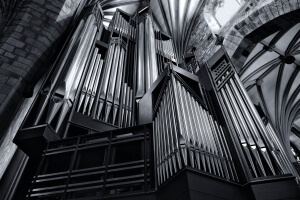Superior Court of New Jersey Cites Separation of Church and State, Precludes Religious Schools From Receiving State Grants
June 10th, 2016

Beth Medrash Govoha and Princeton Theological Seminary may be denied state grant money due to a New Jersey Superior Court ruling.
On May 26, 2016, the Superior Court of New Jersey, Appellate Division, citing separation of church and state, held that two religious institutions may not receive their allotted $11 million in state grants. The Court’s holding stems from a lawsuit filed by the American Civil Liberties Union of New Jersey (ACLU-NJ) in 2013. The ACLU-NJ sought to block the state from awarding grants to Beth Medrash Govoha and Princeton Theological Seminary. Beth Medrash Govoha, located in Lakewood, New Jersey, is an all-male yeshiva that trains orthodox Jewish rabbis. Princeton Theological Seminary, located in Princeton, New Jersey, trains Christian ministers.
On August 7, 2012, Governor Chris Christie signed a law allocating $1.3 billion in taxpayer funds dedicated to campus construction and renovation projects for universities and colleges in New Jersey. Beth Medrash Govoha was slated to receive $10.6 million to pay for a new library and academic center, and Princeton Theological Seminary was to receive $645,323 for technology upgrades.
While Beth Medrash Govoha and Princeton Theological Seminary were not the only religious schools scheduled to receive grant money, they were the only two institutions singled out in ACLU-NJ’s lawsuit. (For example, the ACLU-NJ did not challenge a grant to Seton Hall, a Catholic school where only men are eligible to become priests.) The ACLU-NJ alleged that the grants to these two institutions violate Article I, Paragraph 3 of the New Jersey Constitution because the institutions would use the grant money to support religious instruction. The ACLU-NJ also alleged that the two institutions engage in gender-based or religion-based discrimination in violation of New Jersey’s Law Against Discrimination. The state of New Jersey (State) responded that the grants do not violate the New Jersey Constitution because the purpose of the grant was to fund classrooms, libraries, and technology – not religious instruction or ministries.
The Court, relying on precedent from 1978, agreed with the ACLU-NJ that the grant money cannot be used to support religious instruction, and barred the two institutions from receiving any grant money. In the 1978 case, the New Jersey Supreme Court held that public schools could not allow religious organizations to utilize school facilities below cost for purposes of religious instruction. Resnick v. East Brunswick Township Board of Education, 77 N.J. 88 (1978). The violations of New Jersey’s Law Against Discrimination were not addressed by the Court.
While supporters of the ACLU-NJ believe that the Court’s decision is a victory for both civil rights and New Jersey taxpayers, supporters for the State and the two institutions involved see this as a missed opportunity for an investment in academic facilities desperately needed. The Court’s decision could cause a slippery slope between discerning funds that go toward renovation and construction, and those that go toward the support of ministries.
The Universal Life Church keeps abreast of legal cases involving religion, and makes it a point to ensure that our religious freedoms are protected. We view the rights of all citizens, regardless of their religious orientation, equally.
(photo courtesy of Ann McGrath)


